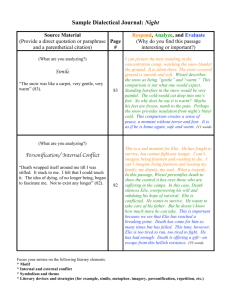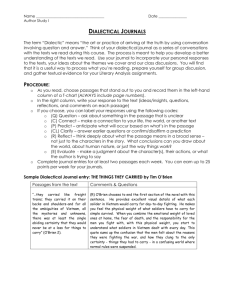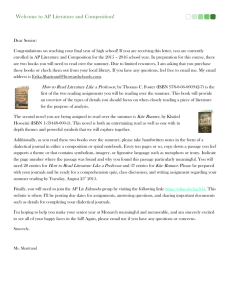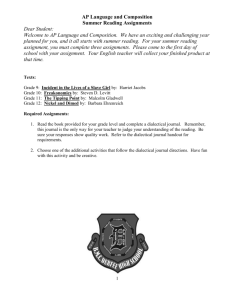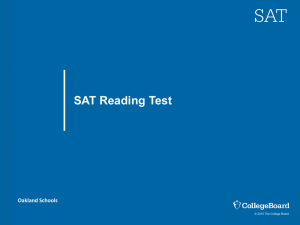dialectical journals
advertisement
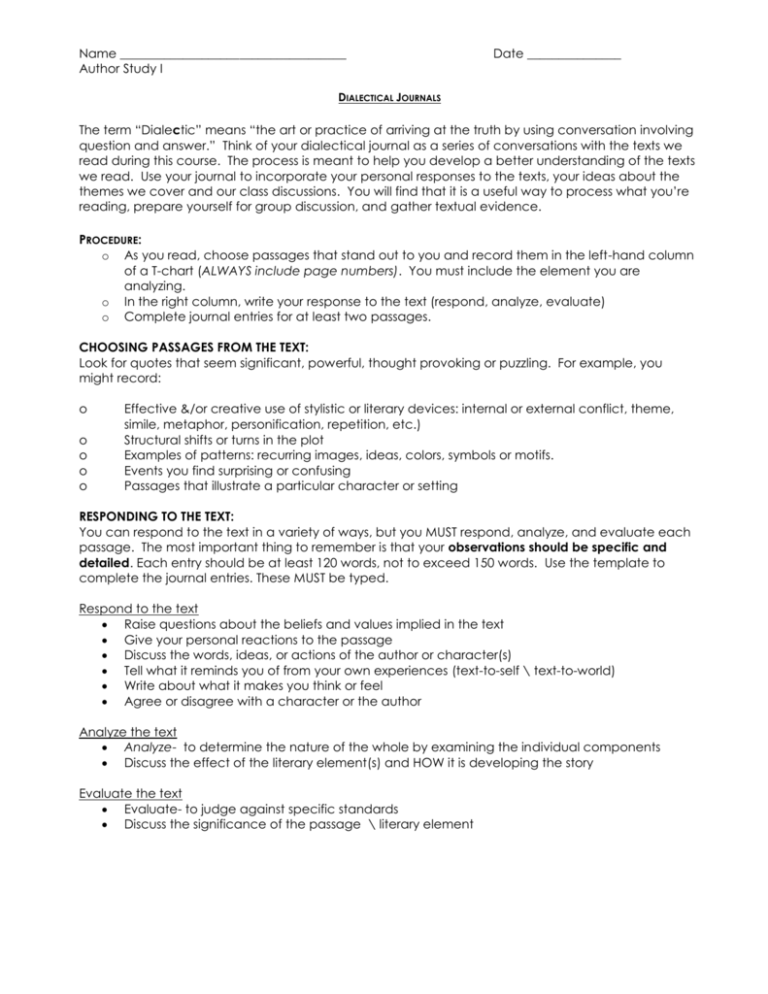
Name ____________________________________ Author Study I Date _______________ DIALECTICAL JOURNALS The term “Dialectic” means “the art or practice of arriving at the truth by using conversation involving question and answer.” Think of your dialectical journal as a series of conversations with the texts we read during this course. The process is meant to help you develop a better understanding of the texts we read. Use your journal to incorporate your personal responses to the texts, your ideas about the themes we cover and our class discussions. You will find that it is a useful way to process what you’re reading, prepare yourself for group discussion, and gather textual evidence. PROCEDURE: o As you read, choose passages that stand out to you and record them in the left-hand column of a T-chart (ALWAYS include page numbers). You must include the element you are analyzing. o In the right column, write your response to the text (respond, analyze, evaluate) o Complete journal entries for at least two passages. CHOOSING PASSAGES FROM THE TEXT: Look for quotes that seem significant, powerful, thought provoking or puzzling. For example, you might record: o o o o o Effective &/or creative use of stylistic or literary devices: internal or external conflict, theme, simile, metaphor, personification, repetition, etc.) Structural shifts or turns in the plot Examples of patterns: recurring images, ideas, colors, symbols or motifs. Events you find surprising or confusing Passages that illustrate a particular character or setting RESPONDING TO THE TEXT: You can respond to the text in a variety of ways, but you MUST respond, analyze, and evaluate each passage. The most important thing to remember is that your observations should be specific and detailed. Each entry should be at least 120 words, not to exceed 150 words. Use the template to complete the journal entries. These MUST be typed. Respond to the text Raise questions about the beliefs and values implied in the text Give your personal reactions to the passage Discuss the words, ideas, or actions of the author or character(s) Tell what it reminds you of from your own experiences (text-to-self \ text-to-world) Write about what it makes you think or feel Agree or disagree with a character or the author Analyze the text Analyze- to determine the nature of the whole by examining the individual components Discuss the effect of the literary element(s) and HOW it is developing the story Evaluate the text Evaluate- to judge against specific standards Discuss the significance of the passage \ literary element Name ____________________________________ Author Study I Date _______________ Sample Dialectical Journal: Night Source Material (Provide a direct quotation and a parenthetical citation) (What are you analyzing?) Pg#s 83 Simile “The snow was a like a carpet, very gentle, very warm” (83). (What are you analyzing?) Personification \ Internal Conflict “Death wrapped itself around me till I was stifiled. It stuck to me. I felt that I could touch it. The idea of dying, of no longer being, began to fascinate me. Not to exist any longer” (82). 82 Respond, Analyze, and Evaluate (Why do you find this passage interesting or important?) I can picture the men standing in the concentration camp, watching the snow blanket the ground. It is silent there. The snow-covered ground is smooth and soft. Wiesel describes the snow as being “gentle” and “warm.” This comparison is not what one would expect. Standing barefoot in the snow would be very painful. The cold would cut deep into anyone’s feet. So why does he say it is warm? Maybe his feet are frozen, numb to the pain, just like his soul is becoming numb and indifferent to the suffering going on around him. Or perhaps the snow provides insulation form the night’s bitter cold. This comparison creates a sense of peace, a moment without error and fear. It is as if he is home again, safe and warm. (125 words) This is a sad moment for Elie. He has fought to survive, but cannot fight any longer. I can’t imagine being fourteen and wanting to die. I can’t imagine being fourteen and losing my family, my dignity, my soul. What a tragedy. In this passage, Wiesel personifies death to show the control it has over those who are suffering in the camps. In this case, Death silences Elie, overpowering his will and subduing his hope of survival. Elie is conflicted. He wants to survive. He wants to take care of his father. But he doesn’t know how much more he can take. This is important because we see that Elie has reached a breaking point. Death has come for him so many times but has failed. This time, however, Eleie is too tired to run, too tore dot fight. Death is offering a gist- an escape from this hellish existence. (153 words) Name ____________________________________ Author Study I Source Material (Provide a direct quotation and a parenthetical citation) (What are you analyzing?) (What are you analyzing?) Pg #s Date _______________ Respond, Analyze, and Evaluate (Why do you find this passage interesting or important?)
